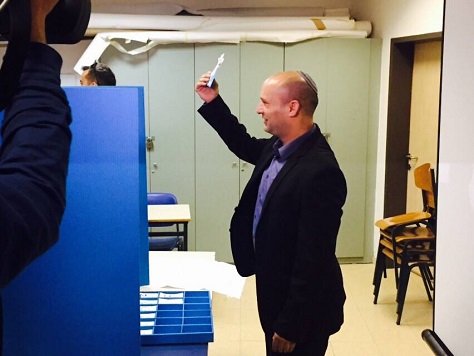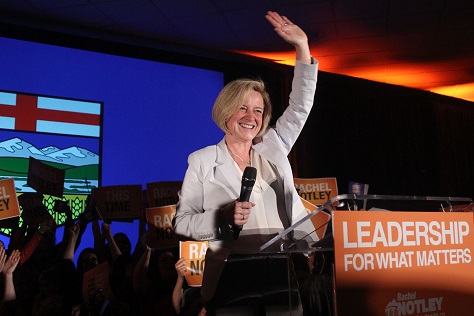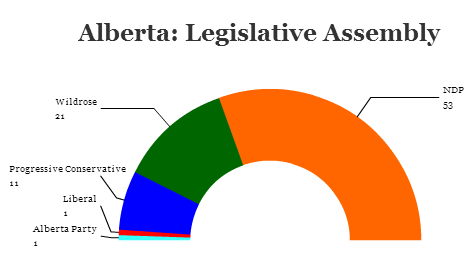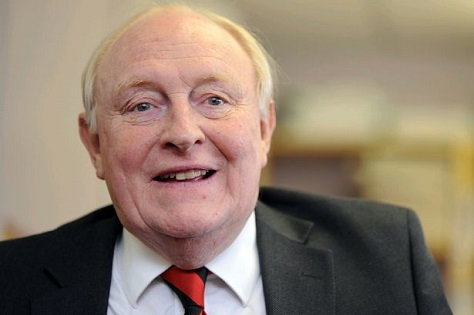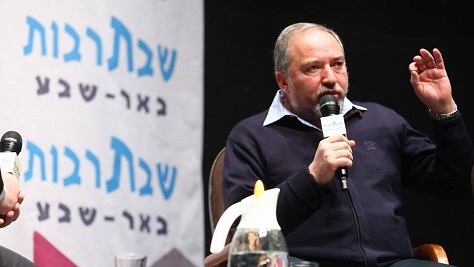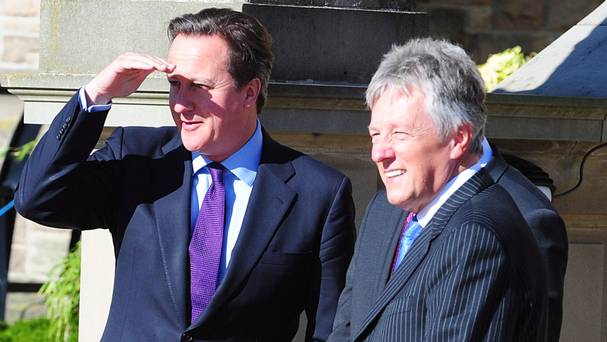At nearly the last hour, Israeli prime minister Benjamin Netanyahu finalized the smallest possible coalition possible.![]()
After Netanyahu’s foreign minister Avigdor Lieberman resigned on Monday and announced that his Russian-interest, secular nationalist Yisrael Beiteinu (ישראל ביתנו, ‘Israel is Our Home’) would head into opposition, it left the prime minister scrambling to build a government with a Wednesday night deadline looming.
Having secured agreements with Moshe Kahlon’s center-right Kulanu (כולנו, ‘All of Us’) and with two ultraorthodox parties, it left Netanyahu and his center-right Likud (הַלִּכּוּד) dependent on the final right-wing party, Bayit Yehudi (הבית היהודי, ‘The Jewish Home’) to form a working coalition. Kahlon, a former Likud communications minister, will serve as the government’s finance minister, is particularly concerned with policies to reduce inequality and rising domestic prices.
* * * * *
RELATED: Lieberman resignation rocks Israeli coalition talks
RELATED: Israeli election results —
eight things we know after Tuesday’s vote
* * * * *
With just eight seats (four fewer than in the previous Knesset) and hard feelings between Netanyahu and the Bayit Yehudi leader, Naftali Bennett, Lieberman’s decision suddenly gave Bennett much more negotiating power. Without Bennett, Netanyahu would not have a majority; Israel’s president Reuven Rivlin could thereupon turn to the leader of the opposition, Isaac Herzog, to seek an alternative government coalition.
The result was a poisonous 48 hours of negotiation between the Netanyahu and Bennett camps, with Bennett angling to win the all-important justice ministry for Ayelet Shaked and, perhaps, improving his own ministerial portfolio from education to the foreign ministry. With Likud’s ranks already grumbling about handing over the education ministry to Bennett, Netanyahu’s allies were downright furious — and embarrassed — to cave to Bennett on the justice ministry. It’s an important post because it will allow Bayit Yehudi to demand changes to the Israeli supreme court and it will give Bayit Yehudi the power to shape the appointment of Israel’s next attorney general.
Bennett, who served as Netanyahu’s chief of staff briefly in the 2000s, headed a pro-settler organization in the West Bank before assuming Bayit Yehudi’s leadership in 2013. The religious, right-wing Zionist party is in favor of greater settlements, and Netanyahu’s lurch rightward during the election campaign was designed to steal its voters to Likud’s ranks — a gambit that seemed to work.
In Netanyahu’s previous government, Bennett served as economy minister, though he enhanced his profile during the Israeli offensive in the Gaza strip in the summer of 2014, criticizing Netanyahu for not taking even stronger action to thwart Hamas.
The deal salvages Netanyahu’s third term as prime minister, but it comes at a huge cost. With just 61 MKs, Netanyahu can be held hostage in the future over any piece of legislation or government action by a single member of his own coalition. Just a couple of rebels could conceivably bring the government down, which could force a new government or fresh elections. After such contentious negotiations, moreover, trust between Netanyahu and Bennett, never strong, is at a nadir. Likud officials are already telling the Israeli media that they’ll seek ‘revenge’ for Bennett’s ‘extortions.’
To make matters worse, Bayit Yehudi is not entirely united behind Bennett’s leadership, and members of the even-harder-right ‘Tekuma’ faction were demanding that their leader, Uri Ariel, be given the justice portfolio instead of Shaked. For now, however, Ariel seems to be happy with the agricultural ministry.
Netanyahu still has another week to win a formal vote of confidence from the 120-member Knesset. But Netanyahu’s first task will start immediately — to build out his existing coalition on an ASAP basis so as to reduce the possibility of political blackmail or even to push Bayit Yehudi out of government altogether.
The most tantalizing option would be for Netanyahu to convince Herzog to form a ‘national unity’ government with the Zionist Union (המחנה הציוני), a coalition between the center-left Labor Party (מפלגת העבודה הישראלית) and a bloc of moderates led by former justice minister Tzipi Livni.
For now, Herzog has been adamant that he will not join any government headed by Netanyahu, and he was quick to criticize the instability of Netanyahu’s latest coalition:
Herzog criticized Netanyahu’s newly formed government shortly after it was announced Wednesday night, saying in a statement that the 61-seat coalition “lacks responsibility, stability and governance.” He called it a “national disaster of a government. A weak and narrow government, susceptible to blackmail, that will advance nothing and will quickly be replaced by a responsible and hopeful alternative.”
Netanyahu purposefully held open the foreign ministry position with an eye to convincing Herzog to join a national unity government.
But if Herzog cannot be convinced to do so within the months ahead, Netanyahu might try to split off a handful of Labor hawks or the faction loyal to Livni, who most recently served as Netanyahu’s justice minister between 2013 and 2015.
Netanyahu’s former finance minister, Yair Lapid, is adamant that he will not return to an alliance with Likud, especially after Netanyahu agreed to the ultraorthodox parties’ request to revisit the crackdown on exemptions from military service for religious students. But that doesn’t mean Netanyahu can’t try to poach several members of Lapid’s centrist Yesh Atid (יש עתיד, ‘There is a Future’).
His final option, and perhaps the easiest of all, is to find a way to soothe his onetime ally Lieberman’s concerns and bring Yisrael Beitenu back into government.
